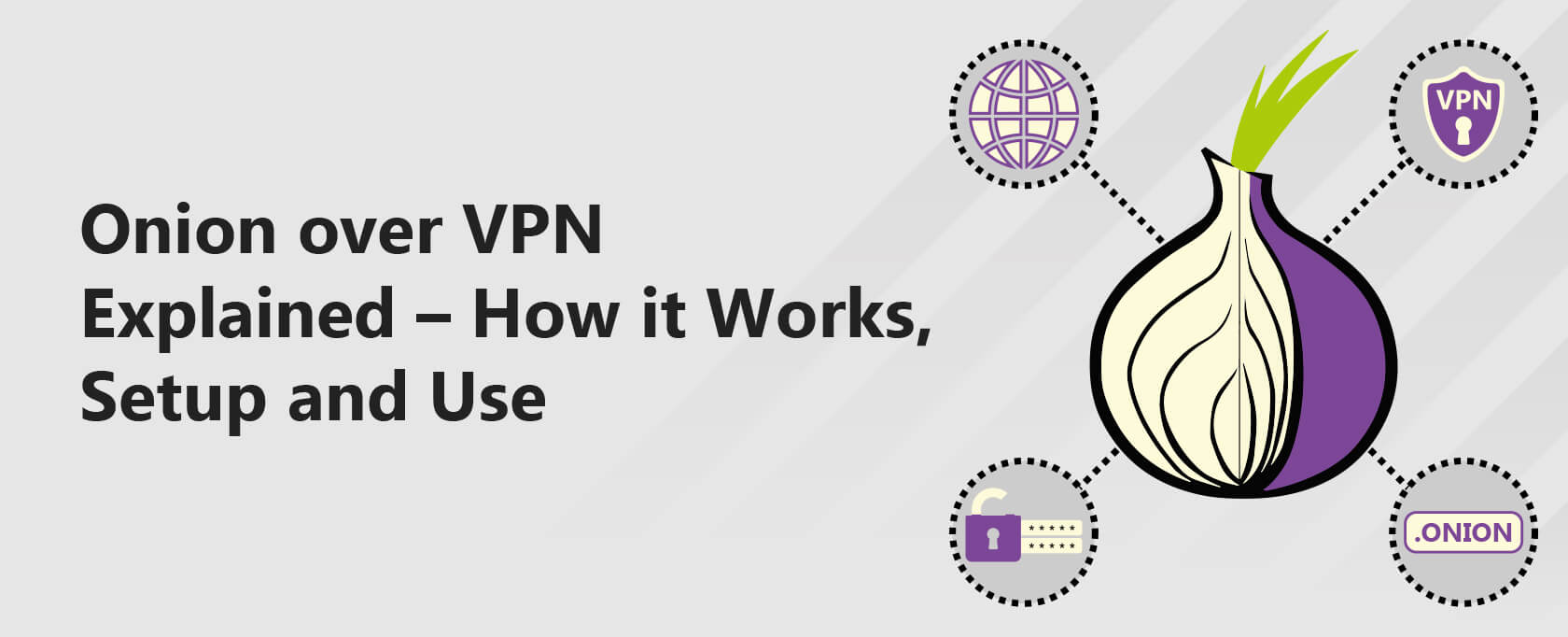Onion over VPN Explained – How it Works, Setup and Use
Onion over VPN adds an extra layer of VPN security while providing the advantages of the Onion network.
- What is Onion over VPN, and how does it works?
- Use cases of Onion over VPN.
- Drawbacks of Onion over VPN.
You will also know VPN over Onion and what VPN providers offer the built-in Onion over VPN feature.
Quick Summary
When navigating the internet, prioritizing security, privacy, and anonymity is essential. A VPN offers exceptional security and privacy, while the Onion network, or The Onion Router (Tor), excels in providing anonymity. By combining these two technologies in an Onion over VPN setup, you can achieve a powerful blend of security, privacy, and anonymity.
This Onion over VPN configuration is particularly crucial for those seeking robust protection online, especially in countries with authoritarian regimes.
Read on to learn more about the benefits and setup of Onion over VPN!
What is Onion over VPN, and How Does it Work?
Onion over VPN combines a VPN connection and The Onion Router network. To understand how it works, you first need to know how a VPN and Tor work individually.
How Does a VPN Work?
A VPN works by establishing a secure connection over the internet. It encrypts your internet traffic and routes it through a VPN server. The VPN server masks your actual IP address.
Internet services will only see the server’s IP address and its geo-location. This combination gives you security and privacy.
Thus, a VPN makes it impossible for prying eyes such as your ISP and other third parties to eavesdrop on your traffic and connection. Additionally, with a VPN, you can bypass geo-restrictions, access blocked content, and circumvent censorship.
How Does Onion (Tor) Work?
Tor works by encrypting your internet traffic and routing it through random servers owned by volunteers. Your Tor connections involve three random servers; entry node, relay/middle node, and exit node.
The entry node is a random entry point connecting you to the Onion network. This node knows your IP address.
Your traffic travels through the network and is passed randomly through various relay nodes. The relay nodes ensure that the exit node doesn’t know the entry node. These nodes add a layer of encryption (like the onion layers).
The exit node decrypts your traffic and sends it to its destination without knowing its origin. Therefore, your online traffic will appear to internet services as originating from the exit node.
In a nutshell, the recipient won’t know who the sender is, and anyone eavesdropping on the network won’t know the recipient’s identity or the sender’s. Thus, Tor helps you avoid surveillance with excellent anonymity.
However, due to encryption and relays involved, Tor is sometimes slow.
How Does Onion over VPN Work?
The Onion over VPN setup works by establishing a VPN connection and then connecting to the Tor network.
By connecting to a VPN first and then the Tor network:
- The entry node will only see the VPN’s server IP address, not your IP address.
- The VPN provider won’t know the contents of your Tor connection.
- Your ISP won’t know if you are using the Tor network.
However, the VPN provider will see your IP address with this setup. To ensure maximum protection, use a reputable no-log VPN.
What about VPN over Onion?
This configuration involves first connecting to the Tor network and then using a VPN. Setting up VPN over Onion can be complex and requires your VPN provider to configure their service to work with Tor in this specific manner.
Most VPN providers do not support this setup. Additionally, VPN over Onion adds an extra layer of privacy that is generally redundant when using a VPN alone.
In this configuration, the VPN won’t know your IP address but will see your decrypted Tor traffic. Your ISP will be able to detect that you are using Tor, and you will be unable to access .onion sites, which are exclusive to the Tor network.
Who Needs Onion over VPN?
The Onion over VPN setup is essential for anyone trying to unblock the Tor network or seeking anonymity while accessing the internet.
Usually, this setup is reserved for:
- Journalists with sensitive information.
- Political activists.
- Dissidents.
- People in oppressive regimes.
Drawbacks of Onion over VPN
Due to the heavy encryption overhead of both the VPN and Tor network, Onion over VPN negatively impacts your internet connection speeds.
Therefore, Onion over VPN isn’t suitable for casual browsing or speed-intensive tasks. Also, you might run into blocked Tor exits; hence the internet service you are trying to access will be unavailable.
VPNs With Onion over VPN Feature
Usually, the Onion over VPN setup uses a VPN provider and the Tor browser. However, this means you will only protect your web traffic with this setup.
Additionally, configuring Tor to work with other applications is a frustrating task. Some VPN providers offer the Onion over VPN feature to overcome these limitations.
This feature allows you to protect your internet traffic with VPN and Tor networks conveniently. However, you will miss the enhanced security and privacy of the Tor browser, such as the end-to-end encryption.
Top reputable VPNs with a built-in Onion over VPN feature include NordVPN and ProtonVPN. These VPNs offer excellent security, ultimate privacy, and speedy connections.
They are also no-log VPNs with favorable jurisdictions; no mandatory data retention laws.
Wrap Up
Onion over VPN gives you an extra layer of security while accessing the internet. You will avoid Tor snoopers and other prying eyes while concealing your access to the Tor network from your ISP.
Using this setup, you can protect yourself from censorship, traffic analysis, state surveillance, and monitoring from other institutions.
This approach is particularly beneficial for individuals such as journalists, political activists, and dissidents, especially in authoritarian countries.
While Onion over VPN can slow down your internet connection, some VPN providers like NordVPN and ProtonVPN offer built-in Onion over VPN features for a more streamlined experience.
Frequently Asked Questions
Some people found answers to these questions helpful
Which VPN is best for Onion over VPN?
Most VPNs will work with the Tor browser to create the Onion over VPN setup. However, you should consider a no-log VPN service since the VPN provider knows your IP address with this setup. Alternatively, you can use NordVPN or ProtonVPN; they offer a no-log VPN service with a built-in Onion over VPN feature.
Is Onion over VPN safe?
Onion over VPN gives you anonymity with an added layer of security. The Tor network won’t see your actual IP address, and the VPN won’t see your Tor traffic. Hence, your connection will be private. Onion over VPN is also an excellent combination that helps you avoid surveillance.
Can I be tracked while using Tor?
It is almost impossible to track someone on the Tor network. Tor works in a way that it is hard to correlate information and identify the users. The relay nodes make sure the exit node doesn’t know the origin of the internet traffic (entry node). Also, the exit node serves as the data origin to the recipient.
Which is better, Onion over VPN or VPN over Onion?
Onion over VPN and VPN over Onion offer their unique upsides and downsides. Onion Over VPN offers anonymity with increased security, while VPN over Onion offers true anonymity with security. Nonetheless, Onion over VPN is easy to set up and is most preferred by most people.
Is the Onion Router a VPN?
No. Although the Onion network and a VPN work somewhat similarly, they are not the same. A VPN’s end goal is to provide security and privacy, while the Onion router provides anonymity. Also, a VPN is much faster than the Onion network. Nonetheless, both tools encrypt your online traffic.


